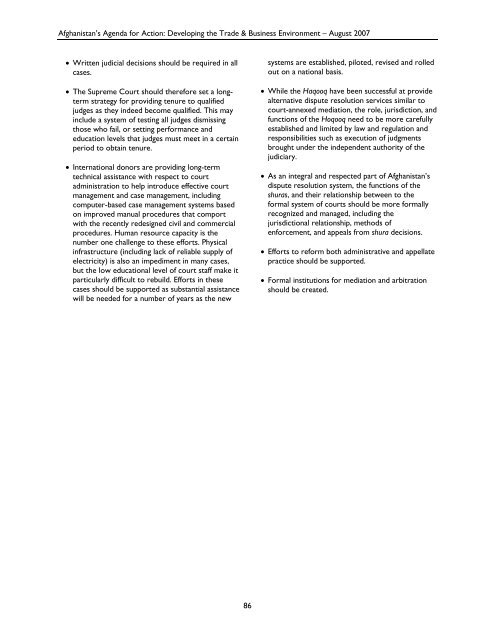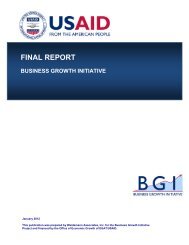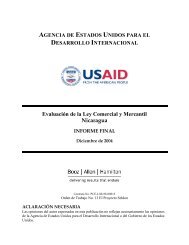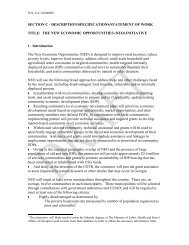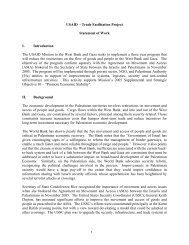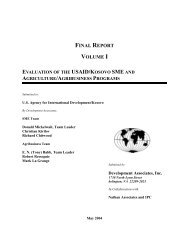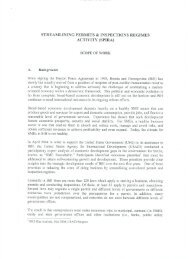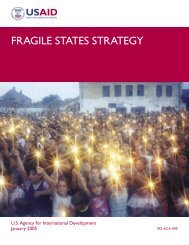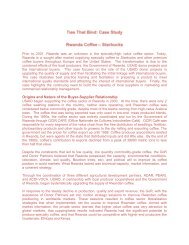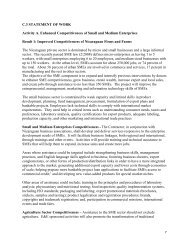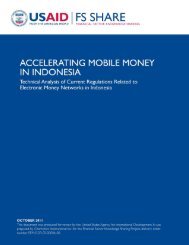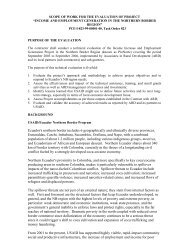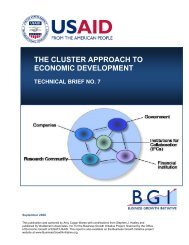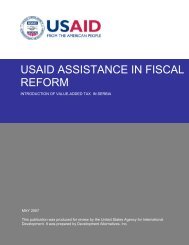Afghanistan’s <strong>Agenda</strong> <strong>for</strong> <strong>Action</strong>: Developing the Trade & Business Environment – August 2007by an authorized body. Thus the laws of Afghanistanare reviewed <strong>for</strong> Sharī’ah compliance by the Taqnin,and all judges are trained in Sharī’ah. Donors canenhance the acceptability of support by assisting Afghancounterparts in applying Sharī’ah analysis to re<strong>for</strong>ms todemonstrate their compliance with the requisitestandards of justice and equity. This can be furtherenhanced by greater use of experts and re<strong>for</strong>m modelsfrom other Islamic countries, as appropriate, ratherthan rely solely or primarily on Western consultantsand orientations, which are inherently suspect in theMuslim world.In addition, this cultural proclivity requires greaterinput from the community, to ensure that their veryappropriate need <strong>for</strong> inclusion is adequately addressed.Such inclusion builds legitimacy, but also builds bettersystems that can be implemented more effectively.Finally, it should be noted that all re<strong>for</strong>ms should bebuilt as much as possible with national input. There is adanger of Kabul-based re<strong>for</strong>ms being rejected in otherregions, especially if people feel that the changes arebeing imposed, are <strong>for</strong>eign to the culture, or both. Thissuggests that commercial arbitration should be piloted– perhaps simultaneously – in all of the principlecommercial centers of the country.There is and will be substantial resistance to courtre<strong>for</strong>m. The current system has allowed a high level ofrent-seeking behavior. This must be met with bothpositive and negative incentives. On the positive side, itis clear that current salary and benefits packages cannotmeet the basic subsistence needs of an individual judge,much less those of a judge with a family. This mustchange. But salary increases alone do not stopcorruption. Corruption flourishes in non-transparentsettings, especially where there is ignorance of the roleand obligations of the judiciary. Extensive publiceducation is needed in Afghanistan to create newexpectations <strong>for</strong> an accountable, professional judiciary.This must be coupled with mechanisms <strong>for</strong> reportingand sanctioning incompetence and corruption.Recommendations• The legal professional lacks an adequate supply oflegally-educated practitioners, including attorneysand judges. Ef<strong>for</strong>ts to bolster legal educationshould be supported, including law schools, judicialtraining centers, etc. This education should includespecific and targeted education on commercial law.Relatedly, a bar association is needed to supportsuch ef<strong>for</strong>ts as well to more generally bolster thelegal profession.• There is a need to increase staffing at primarycourts to alleviate the need <strong>for</strong> courts of appealsto also act as courts of first instance.• Legal limitations on arbitration, while often noten<strong>for</strong>ced, should be removed from the law toavoid future conflict between accepted practiceand the law on the books.• The length of legal proceedings are unreasonableand as a result do not provide fair protection of aparties economic interests. Delays existthroughout the system, from basic functions ofcourt administration to execution of judgments,<strong>for</strong> reasons including rent-seeking behavior,administrative inefficiencies and lack of education.The Supreme Court needs to continue and expandits work in carefully establishing internal strategies,goals, procedures and regulations <strong>for</strong> the ongoing,permanent professionalization of the courts,judges, clerks and administrators. Ongoing re<strong>for</strong>mef<strong>for</strong>ts in this regard must be supported.• The fee structure <strong>for</strong> bringing claims isinappropriate and will need to be amended, soonerrather than later. Fees are not based on the costsof the services rendered and are only assessed atjudgment. If the parties withdraw a case be<strong>for</strong>ecompletion, fees will likely not be paid, or will onlybe so after a period of years. the courts cannoteffectively predict budgetary needs based on thissystem of contingent fees assessed againstunknown future awards. At the same time, thepercentage based accounting creates inappropriateincentives <strong>for</strong> the courts to award higher fees tomake up <strong>for</strong> shortfalls in budgetary resources. Allof these factors serve to discourage legitimate useof the judiciary.• Judge’s salaries should be increased to attract wellqualified judges and staff.85
Afghanistan’s <strong>Agenda</strong> <strong>for</strong> <strong>Action</strong>: Developing the Trade & Business Environment – August 2007• Written judicial decisions should be required in allcases.• The Supreme Court should there<strong>for</strong>e set a longtermstrategy <strong>for</strong> providing tenure to qualifiedjudges as they indeed become qualified. This mayinclude a system of testing all judges dismissingthose who fail, or setting per<strong>for</strong>mance andeducation levels that judges must meet in a certainperiod to obtain tenure.• International donors are providing long-termtechnical assistance with respect to courtadministration to help introduce effective courtmanagement and case management, includingcomputer-based case management systems basedon improved manual procedures that comportwith the recently redesigned civil and commercialprocedures. Human resource capacity is thenumber one challenge to these ef<strong>for</strong>ts. Physicalinfrastructure (including lack of reliable supply ofelectricity) is also an impediment in many cases,but the low educational level of court staff make itparticularly difficult to rebuild. Ef<strong>for</strong>ts in thesecases should be supported as substantial assistancewill be needed <strong>for</strong> a number of years as the newsystems are established, piloted, revised and rolledout on a national basis.• While the Haqooq have been successful at providealternative dispute resolution services similar tocourt-annexed mediation, the role, jurisdiction, andfunctions of the Hoqooq need to be more carefullyestablished and limited by law and regulation andresponsibilities such as execution of judgmentsbrought under the independent authority of thejudiciary.• As an integral and respected part of Afghanistan’sdispute resolution system, the functions of theshuras, and their relationship between to the<strong>for</strong>mal system of courts should be more <strong>for</strong>mallyrecognized and managed, including thejurisdictional relationship, methods ofen<strong>for</strong>cement, and appeals from shura decisions.• Ef<strong>for</strong>ts to re<strong>for</strong>m both administrative and appellatepractice should be supported.• Formal institutions <strong>for</strong> mediation and arbitrationshould be created.86


